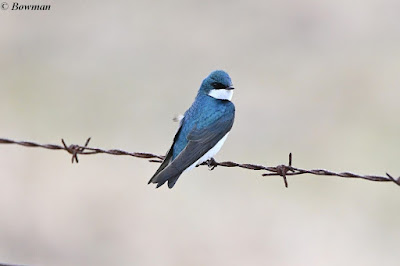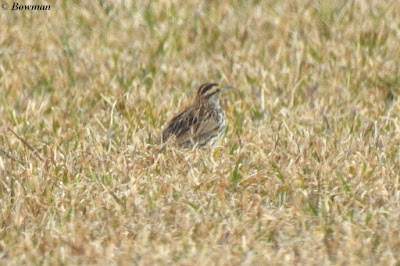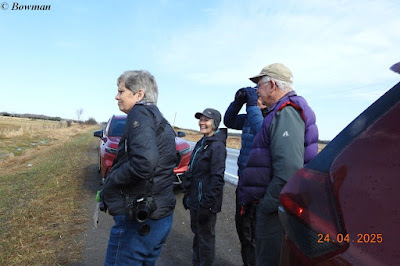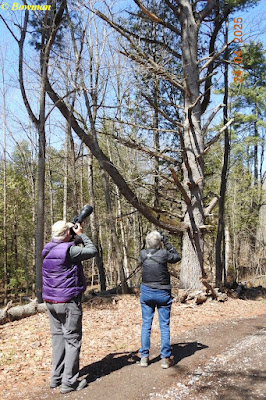April 24, 2025
Birding Report by Jane Burgess
Ken, Alan, Carole, Richard, Pat,
Eleanor, Bill, Barbara and I met at the park & ride at Eagleson and
the Queensway at 7:30 and we went directly to Panmure with hopes
high that we would see the Mountain Bluebird. When we arrived there
were people already there and we were told no one had yet seen the
Mountain Bluebird. We were there maybe 15 minutes when someone said
that there was a shrike way back on the top of a snag. Was it a
Northern Shrike or a Loggerhead Shrike? It was far and the subtleties
between the two species were very difficult to see. After a lot of
discussion, the conclusion was Northern Shrike.
Eleanor
noticed a little white bug on Bill's jacket. She initially thought it
was a little feather but it moved. There is a photograph of it, if
anyone knows what the bug is please let me know. Maybe some kind of
little spider.
The Eastern Meadowlarks were
singing up a storm, but to actually see them was a challenge. They were
singing in the field, not flying too much, but we did see the occasional
bird. It certainly did not help that there was a wind and it was cold
out. Gloves and a hat were definitely needed, We saw two Upland
Sandpipers high in the sky, then in the grass, I prefer seeing them
perched on a wire or on a fence, but that was not the case today.
Eleanor and I walked up Panmure a bit and we did see a Wilson's Snipe,
unmistakable the dark brown with the bold cream stripes on its back and
the long bill, then it flew to behind some brush, we did not see it
again.
There was a pair of Tree Swallows
perched near a bird box, then the female flew to the box staking claim
to it, I imagine. We saw a Ruby-crowned Kinglet on the other side of
the road, it flew in, checked out the tree and flew again, Enough time
to identify it, but not enough time to enjoy the little bird.
There
were several Kestrels flying about, I just love to watch them hovering
looking for food. We walked back to where most of the people were, the
corral area where the Bluebird had been seen. No luck, the bird had not
appeared yet. Eleanor and Ken walked back to the car to change into
warmer clothes. While they were changing a male Northern Harrier flew
quite close to them, but they were busy disrobing to notice, It was
cold.
Bill, Barbara and I decided it was time
to warm up, into the car with the heater on. We drove to Upper Dwyer
Hill Road to see if we could get a better view of the Upland
Sandpipers. We did not, but we did get good views of the Eastern
Meadowlarks but still the birds were far away. While checking out one
of the fields, Richard asked where we were going. There were dark
clouds overhead and the rain looked imminent. Richard and Pat decided
to call it a day. Saying goodbye, I looked in my binoculars and I
spotted Connie. Connie, Sami and Lynne had arrived, it was good to see
them. Driving over to where Connie was we told her that we were
heading out to Holland Marsh for the Yellowlegs, would she join us. No,
they had just arrived and had we seen the Bluebird? No. Unfortunately
the weather was cold and windy and we figured if the bird showed up it
could be in the warmer weather that had been predicted. We told the
others of our plans.
While driving to Holland Marsh, the rain came down in buckets. Alan and Carole got to the marsh
first. About 6 Greater Yellowlegs were there. While taking photos, the
rain was just coming down, making the job challenging. We drove to
the bridge over the Mississippi, only birds we saw there were Canada
Geese and Green-winged Teal. We spoke to Alan and Carole and they
reported more Greater Yellowlegs had arrived at the marsh and just after
we left a flock of Green-winged Teal left the marsh. The rain had
subsided, Eleanor took out her scope to check out the marsh, she found a
Killdeer. While she was scoping the marsh a small flock of ducks flew
overhead. Eleanor, look up, Northern Pintail? Her answer to me was
don't you just love it when you now can identify another species.
We
discussed where we would go next, Ken thought it might be good to go
looking for the Varied Thrush that had not been seen in a while. I
suggested to Bill, let's go to where we see Yellow-bellied Sapsuckers.
He knew exactly where I meant. He gave the others directions to
Pakenham.
We turned on to County Road 17, and
Alan and Carole were behind us, but not Ken and Eleanor. I called them
asking where they were and gave them the directions to where we were.
We got to the Yellow-bellied Sapsucker place and those birds did not
disappoint. We saw them several times and concluded there were two
pairs. The bellies on the sapsuckers were really yellow, typical for the
spring with no fading of feathers at this point in time. The others had
not shown up, when they did they reported seeing 4 Broad-winged Hawks and
one Red-shouldered hawk. Good birds.
We had
lunch at the Yellow-bellied Sapsucker place, time was around 11:30, but
we were all hungry, not sure if it was the early start or the cold
weather burning up the calories. It had warmed up enough that we ate our
lunch outside, some using the vehicles as chairs. Ken and Eleanor left
us and we told Alan and Carole our plans. They decided to go back to
the Bluebird spot as they were not interested in crossing Ottawa at the
height of rush hour.
As we drove along the Bellamy Road we came up a stream. Looking down the farmer's long laneway
we saw a Belted Kingfisher (first of the season for us). As we were
driving off, we saw another one, much further away. We were driving
with the windows open so we could hear the bird song, we stopped and
heard a Pileated Woodpecker. Trying to find the Pileated Woodpecker
Bill saw a Hairy Woodpecker. We had not driven very far when we saw a
large bird in the sky crossing the road -- Sandhill Crane -- a totally
unexpected bird.
While driving back, we saw
this bird on the fence - mm wonder what it is. It flew to the hydro
line where we could easily identify it. First female Red-wing Blackbird
we have seen this spring.
Along the road we
saw three clumps of yellow flowers. Bill what are those flowers called
-- Coltsfoot, one of the first flowers to bloom in the spring. Seeing
them from afar I thought they looked like dandelions, so wrong. Some
people think they are a pest and invasive. Definitely a plant from
Europe, Africa and Asia, it was imported because of the medicinal
properties. It can be eaten, but in moderation due to the presence of
alkaloids which can be toxic in large quantities.
We
drove back to the Bluebird sight looking for Eastern Bluebirds, we were
unsuccessful. Those birds had better hurry up, as all the nest boxes
will be claimed by Tree Swallows. We parked on Panmure and Bill took
out his scope -- 6 Upland Sandpipers. I don't want you to think we saw 6
right away, first 3 then 3 became 4 then 5 and finally 6. They were
far away and we could see them in the scope. I tried to take some
photos, what a joke, the birds look like sandpiper ghosts all fuzzy and
out of focus and add heat haze, but one could make out birds.
The
Kestrels kept us entertained. While we were there, a Broad-winged Hawk
flew over. I think 5 or 6 Broad-wing Hawks were seen during the course of
the day.
Bill thought it was time to go home,
arriving at his place at 3:30.
Species Noted
- Northern Cardinal
- American Crow
- Dark-eyed Junco
- Song Sparrow
- Ring-billed Gull
- Canada Goose
- European Starling
- Common Grackle
- Red-winged Blackbird
- Upland Sandpiper
- Wilson's Snipe
- Blue Jay
- Meadowlark
- Northern Shrike
- Tree Swallow
- American Goldfinch
- Mallard
- Kestrel
- Northern Harrier
- Ruby-crowned Kinglet
- White-breasted Nuthatch
- Black-capped Chickadee
- Chipping Sparrow
- Broad-winged Hawk
- Eastern Phoebe
- Common Raven
- American Robin
- Wild Turkey
- Greater Yellowlegs
- Green-winged Teal
- Northern Pintail
- Killdeer
- Wood Duck
- Turkey Vulture
- Northern Flicker
- Red-shouldered Hawk
- Belted Kingfisher
- Pileated Woodpecker
- Hairy Woodpecker
- Sandhill Crane
- White-throated Sparrow
Critters Noted
- Chorus Frogs. - Bill is the frog expert -- identified the sounds.
- Spring Peepers
- Wood Frog
- Painted Turtles
- Groundhog
Flowers etc
- Coltsfoot




























No comments:
Post a Comment